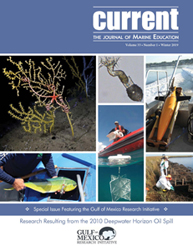 Outreach coordinators from Gulf of Mexico Research Initiative (GoMRI) consortia partnered to produce a special issue of Current: The Journal of Marine Education, published by the National Marine Educators Association (NMEA). The GoMRI-sponsored special issue – titled “Special Issue Featuring the Gulf of Mexico Research Initiative: Research Resulting from the 2010 Deepwater Horizon Oil Spill” – features synthesis articles on oil spill science and educational resources that educators can use to incorporate oil spill science into their curriculums. The goal of the issue is to convey the scientific process using the Deepwater Horizon oil spill and GoMRI as an example.
Outreach coordinators from Gulf of Mexico Research Initiative (GoMRI) consortia partnered to produce a special issue of Current: The Journal of Marine Education, published by the National Marine Educators Association (NMEA). The GoMRI-sponsored special issue – titled “Special Issue Featuring the Gulf of Mexico Research Initiative: Research Resulting from the 2010 Deepwater Horizon Oil Spill” – features synthesis articles on oil spill science and educational resources that educators can use to incorporate oil spill science into their curriculums. The goal of the issue is to convey the scientific process using the Deepwater Horizon oil spill and GoMRI as an example.
Click here for a free PDF copy of the issue (hosted with permission from NMEA).
The special issue includes:
- A Current Log (forward) from GoMRI Research Board Chair Dr. Rita Colwell
- An introduction highlighting the issue’s goals
- Descriptions of each of the GoMRI-funded consortia + links to external communications partners
- Five main articles discussing: (1) where oil went after the Deepwater Horizon oil spill; (2) the story of marine oil snow; (3) the spill’s impacts on organisms and habitats; (4) technological advancements resulting from the spill and the GoMRI investment; and (5) a feature on data sharing, data transparency, and the Gulf of Mexico Research Initiative Information and Data Cooperative (GRIIDC).
- Lesson plans, classroom activities, and other educational resources related to the research discussed
Jessie Kastler (Consortium for Oil Spill Exposure Pathways in Coastal River-Dominated Ecosystems, CONCORDE), Katie Fillingham (GoMRI Management Team), Sara Beresford (Ecosystem Impacts of Oil and Gas Inputs to the Gulf consortium, ECOGIG), and Teresa Greely (Center for the Integrated Modeling and Analysis of the Gulf Ecosystem, C-IMAGE) served as co-editors and co-authors for the special issue.
Laura Bracken (Consortium for Advanced Research on Transport of Hydrocarbon in the Environment, CARTHE), Murt Conover (Coastal Waters Consortium, CWC), Emily Davenport (ECOGIG), Dan DiNicola (formerly Relationships of Effects of Cardiac Outcomes in Fish for Validation of Ecological Risk consortium, RECOVER), Sandra Ellis (GRIIDC) and Rachel McDonald (Alabama Center for Ecological Resilience, ACER) also served as co-authors.
Permission has been granted to the Gulf of Mexico Research Initiative (GoMRI) to reprint the special issue of Current: The Journal of Marine Education featuring the Gulf of Mexico Research Initiative (Vol. 33, No. 1, Winter 2019) published by the National Marine Educators Association (NMEA) ©2019. For more information about the NMEA, please visit www.marine-ed.org.
**********
The Gulf of Mexico Research Initiative (GoMRI) is a 10-year independent research program established to study the effect, and the potential associated impact, of hydrocarbon releases on the environment and public health, as well as to develop improved spill mitigation, oil detection, characterization and remediation technologies. An independent and academic 20-member Research Board makes the funding and research direction decisions to ensure the intellectual quality, effectiveness and academic independence of the GoMRI research. All research data, findings and publications will be made publicly available. The program was established through a $500 million financial commitment from BP. For more information, visit http://gulfresearchinitiative.org/.
